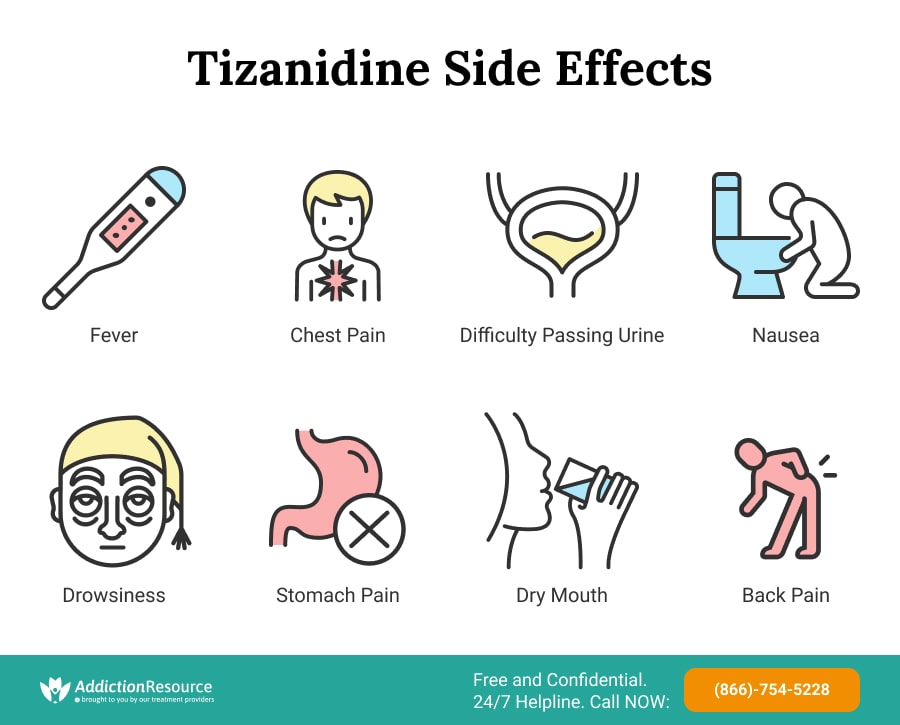
Tizanidine is a prescription medicine commonly used in treating muscle spasticity by temporarily relaxing muscles. The Tizanidine oral tablet is usually known by the brand-name drug Zanaflex.
Tizanidine side effects include drowsiness, dizziness, weakness, dry mouth, and in some cases, liver damage, low blood pressure, hallucinations, and depression. Zanaflex Warnings are essential for patients with liver or kidney disease, older adults, pregnant women, and those taking blood pressure medications or CYP1A2 inhibitors due to increased risk of adverse reactions.
Precautions to prevent side effects of tizanidine involve starting with the lowest effective dose, regular medical checkups, avoiding alcohol consumption, refraining from dangerous activities like driving, monitoring vital signs, and reporting unusual symptoms immediately. Patients benefit from consistent timing of doses and knowing when to contact healthcare providers. The medication requires careful observation of digestive health, muscle function, blood pressure, and weight changes throughout treatment for safety and effectiveness.
Table Of Contents:
- What Are the Common Tizanidine Side Effects?
- Which Are the Dangerous Side Effects Of Zanaflex?
- Can Zanaflex Side Effects Cause Death?
- What to Do in Case of Tizanidine Overdose?
- Tizanidine Pregnancy and Breastfeeding Warnings
- Variables That Affects Side Effects Emergence
- Precautions to Prevent Side Effects
- Key Information on Tizanidine

What Are the Common Tizanidine Side Effects?
Tizanidine uses usually involve treating muscle spasticity caused by multiple sclerosis, spinal cord injury. When taking Tizanidine, it is beneficial for one’s health to do so as directed. It is often available as an oral tablet or oral capsule. Therefore, it is convenient for patients, although substituting the tablets and capsules with each other should not be done.
Although it is an efficient drug for treating muscle spasms, patients might also experience some of its adverse effects. It is a short-acting medication. Thus it takes only 1 and 3 hours to notice its results and outcomes. The typical adverse outcomes of Zanaflex can be divided into short-term and long-term.
The Short-Term Tizanidine Side Effects Include:
- Chills or fever
- Chest pain
- Burning or pain while urinating
- Nausea or vomiting
- Dizziness or drowsiness
- Unusual tiredness
- Diarrhea or constipation
- Stomach pain
- Dry mouth
- Back pain
- Muscle weakness
- Sweating

Many of these adverse outcomes will go away as the body adjusts to the drugs during the treatment period. However, a doctor will also give information to the patient about reducing or even preventing some of these adverse effects, which can be long-term.
These Include:
- Depression
- Liver disease
- Kidney disease
- Weight gain
- Joint pain
The list of possible Tizanidine side effects can look overwhelming; however, it is good to remember that only very few people experience these symptoms at all. Furthermore, if a medication is approved by the Food and Drug Administration, most people will tolerate it.
Which Are the Most Dangerous Side Effects Of Zanaflex?
As mentioned above, some of the effects of Zanaflex are commonplace and do not put the patient’s life in danger. But, unfortunately, there are some situations when the side effects of Zanaflex can be life-threatening.
Allergic Side Effects
Although only about 5 to 10% of adverse reactions to drugs are allergic, the patient should immediately call for an ambulance or go to the nearest emergency room at the first signs of a possible allergic reaction. For example, the patient might have an allergic reaction to Tizanidine, resulting in itching, vomiting, trouble breathing, anxiety, and even anaphylaxis leading to death. There may also be a rash, swelling of the face, hands, lips, tongue, or difficulty swallowing.
Side Effects With Other Medicines
One of the contraindications is combining it with medical prescriptions that can slow down breathing or cause sleepiness. Therefore, the patient should inform the doctor before taking prescription cough medicine, narcotic pain medicine, sleeping pills, medicine for seizures, depression or anxiety, or muscle relaxers.
Side Effects Involving the Heart
Tizanidine might cause an irregular heartbeat in some patients, known as QT prolongation, which can be life-threatening. The condition can cause seizures, fainting, and even sudden death. Thus, the patient should tell the doctor if they know themselves at risk for heart rhythm problems. Also, Zanaflex can cause tiredness, sleepiness, a delay in reactions, and lightheadedness, increasing the chances of mechanical failure, which can cause death.
Can Zanaflex Side Effects Cause Death?
As mentioned earlier, although people typically tolerate Tizanidine and find it relieving, there are still dangerous adverse effects to beware of since they can be life-threatening. These usually involve allergic reactions and heart trouble, such as slowing down the heart rate and reducing blood pressure.
Overdosing on it can also be fatal and even lead to coma. How toxic it depends on individual tolerance and the presence of other similar drugs. However, patients need to be careful when taking the medication; in a study of 523 homicidal poisonings, 65% involved medicines, including muscle relaxers.
What to Do in the Case of Tizanidine Overdose?
Taking multiple doses of Tizanidine can lead to overdose symptoms that include weakness, drowsiness, and confusion. Tizanidine overdose may be accidental or indented. Usually, when there is an overdose, certain medications can counter the toxic outcomes, but there is no known antidote for Tizanidine toxicity. However, the only dependable way to withdraw from an overdose is by using a medically supervised detoxification to properly decrease the medication while monitoring and treating acute adverse effects.
Suppose a patient is taking multiple doses of Tizanidine; it can lead to overdose symptoms that include weakness, drowsiness, and confusion. There can also be slow heart rate, shallow breathing, lightheadedness, or fainting. If these symptoms appear, those who overdosed or loved ones must seek the nearest emergency hospital services.

Tizanidine Pregnancy and Breastfeeding Warnings
The research on this medication used by pregnant women is limited. However, in some animal studies, the drugs caused congenital disabilities and other pregnancy problems. Hence, the US Food and Drugs Administration has placed Tizanidine in pregnancy category C.
It should only be used when the risks outweigh the benefits because of possible dangers. For instance, 35–50% of spinal cord injuries are due to motor vehicle accidents. Therefore, Tizanidine may be more beneficial than harmful and warrant use if a pregnant woman has such an injury despite potential risks.
In addition, it is not clear whether the drugs cross into breast milk, so safety has not been established. However, it is possible as it is lipid-soluble. Therefore, nursing parents should alert their physicians that they are breastfeeding before. However, Tizanidine oral tablet is not recommended. Nonetheless, if used, the nursing infant should be observed for toxicity such as low blood pressure, sedation, and hallucinations.
Variables That Affects Side Effects Emergence
All medications can cause side effects. However, most people experience no adverse effects or only minor ones. The likelihood of having negative effects from medicines depends on certain variables.
In some older people, the kidneys do not function properly. That means they process the drug more slowly, resulting in Zanaflex staying in the body for a longer time. In addition, the knock-on effect increases the risk of Zanaflex side effects; thus, the elderly should have the smallest effective doses.
Pre-existing Health Conditions
For instance, it occasionally causes liver injury. Thus if a patient has liver disease already, that can be dangerous. Also, if the patient has kidney disease, it can cause the medication to accumulate in the body.
Types of Intake
The medicine is available in different forms, tablets, and capsules. The capsules are often absorbed further in the digestive system and are less likely to cause symptoms such as dry mouth. Suppose the medication is taken with food or without. The patient can choose either option but should be consistent in administering Zanaflex and its dose.
Individual Tolerance
Every person is different. Therefore some people naturally get used to these medical pills faster than others.
Interactions With Other Substances
Combinations of medicines with others or substances such as alcohol can increase the effects. So not respecting the Tizanidine contraindications and combining it with other drugs can be dangerous.
Allergy to the Drug
It is typically rare to have a severe allergic reaction to any doses of Tizanidine. However, like individual tolerance, everyone differs. Suppose there’s any notice of symptoms such as swelling, trouble breathing, and severe dizziness. Then medical help is required.
Precautions to Prevent Side Effects Of Tizanidine
Asking the doctor for the correct information about the possible Tizanidine side effects from its doses can help the patient know what to expect from this drug and how to handle adverse reactions. Usually, when taking Tizanidine, the patient starts at the lowest possible amount. Then, the doctor gradually increases it after regular checkups.
There are no Tizanidine headaches precautions because it can treat daily headaches, including migraine and tension-type headaches.
Tizanidine Precautions on Digestion
On such checkups, the doctor should be informed right away if there are digestive system problems. These include dark urine, pale stools, pain in the upper stomach, nausea, vomiting, decreased appetite, or yellow skin or eyes. These might be signs of a severe liver problem.
Tizanidine Precautions on Muscles
Doses should be avoided when muscle tone is needed for safe balance and movement during certain activities. For example, it may be dangerous to have a relaxed muscle tone when driving. In addition, patients should discontinue any hazardous activity because of impaired reactions. Sudden movements can cause adverse effects of Zanaflex, such as lightheadedness, dizziness, or fainting.
Tizanidine Blood Pressure Precautions
Tizanidine blood pressure precautions are necessary because they might lead to a dangerous decrease in blood pressure, causing fainting or dizziness. That’s why the doctor will prescribe the lowest possible dose of Tizanidine to prevent this risk, which is still efficient for the patient. If the individual is already under treatment with drugs that lower blood pressure, they will need to be more attentive to their blood pressure charting. They should seek help if there are any concerning changes to their health.
Tizanidine Weight Precautions
Does Tizanidine cause weight gain? It is possible. If there is weight gain, the doctor will keep a close eye by closely monitoring any change in weight and ask about exercise or eating habits. The doctor will also do a physical exam to get information about the difference in weight that does not have a particular cause, such as a pregnancy or retaining fluids. Suppose the drug causes weight gain, and it starts to affect the health of the individual. In that case, the doctor might recommend a different medicine to the patient.

Key Information on Tizanidine
It is a muscle relaxant typically prescribed for use in multiple sclerosis, stroke, and spinal cord injuries. It is a short-acting medication with adverse short-term outcomes: chills or fever, pain, nausea or vomiting, diarrhea, drowsiness, tiredness, and others. Also, adverse long-term side effects of Tizanidine include depression, liver disease, kidney disease, weight gain, and joint pain. Dangerous side effects of Tizanidine involve anaphylaxis or allergy, coma, and heart problems. Also, it is not recommended in pregnancy or when breastfeeding.
Tizanidine should be started with the lowest possible dose to prevent adverse effects, and regular checkups are also necessary. If the drug causes weight gain, which affects the individual’s health, the doctor recommends a different medicine. There are no Tizanidine headaches precautions; however, blood pressure, muscles, digestion, and weight should be observed while taking the medication.
Like many medications, Tizanidine is addictive over time or through deliberate misuse. Some people can get addicted to the drugs because it helps with insomnia, as a common side effect of the drug is sleepiness. It also helps with battling chronic pain. Thus, patients have to be wary since there can even be a Tizanidine overdose. If there is an addiction, Tizanidine is gradually weaned off with a reduced dose until it is stopped to avoid withdrawal symptoms in a step-down regiment at a rehab or detox center.
Hope Without Commitment
Find the best treatment options. Call our free and confidential helpline
Most private insurances accepted
Find Drug Rehabilitation Centers Near You Anywhere In the US
Addiction Resource team has compiled an extensive list of the top drug rehabilitation facilities around the country. Use our locator tool to find the best centers near you.
Page Sources
- Li X, Jin Y. Irreversible profound symptomatic bradycardia requiring pacemaker after tizanidine/loxoprofen combination therapy: a case report. J Int Med Res. 2018 Jun;46(6):2466-2469.
- Henney HR, Chez M. Pediatric safety of tizanidine: clinical adverse event database and retrospective chart assessment. Paediatr Drugs. 2009;11(6):397-406.
- Farkas S, Berzsenyi P, Kárpáti E, Kocsis P, Tarnawa I. Simple pharmacological test battery to assess efficacy and side effect profile of centrally acting muscle relaxant drugs. J Pharmacol Toxicol Methods. 2005 Sep-Oct;52(2):264-73.
- Ghanavatian S, Derian A. Tizanidine. [Updated 2021 Aug 13]. In: StatPearls [Internet]. Treasure Island (FL): StatPearls Publishing; 2021 Jan.
- Medici, M., Pebet, M., & Ciblis, D. (1989). A double-blind, long-term study of Tizanidine (‘Sirdalud’) in spasticity due to cerebrovascular lesions. Current medical research and opinion, 11(6), 398–407.
- Suárez-Lledó, A., Padullés, A., Lozano, T., Cobo-Sacristán, S., Colls, M., & Jódar, R. (2018). Management of Tizanidine Withdrawal Syndrome: A Case Report. Clinical medicine insights. Case reports, 11, 1179547618758022.
- LiverTox: Clinical and Research Information on Drug-Induced Liver Injury [Internet]. Bethesda (MD): National Institute of Diabetes and Digestive and Kidney Diseases; 2012-. Tizanidine. [Updated 2017 Jan 30].
- Frascarolo, S., Moutinot, B., & Sartori, C. (2021). Le point sur la tizanidine en médecine de premier recours [Focus on tizanidine in primary care medicine]. Revue médicale suisse, 17(746), 1374–1376.


 Reviewed by:
Reviewed by:  Written by:
Written by: 
 FindTreatment.gov
FindTreatment.gov